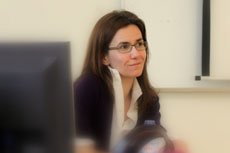Keywords:
critical media studies; science and technology studies; feminist technoscience; ethnography; emergent technologies; body-machine interaction;innovation studies; politics of technology; identity and agency
Ana Viseu is Associate Professor at the School of Technology, Arts and Communication, Universidade Europeia, and a member of the Centro Interuniversitário de História das Ciências e Tecnologia, Faculdade de Ciências, Universidade de Lisboa. Previously, she was an Assistant Professor in the Department of Communication Studies at York University, Canada. In 2013 she returned to her home country, Portugal, to become a Marie Curie Fellow. In 2019 she was honored as one of Portugal’s 100 Female Scientists. In 2018, she was elected by her peers as a Council Member for the Society for Social Studies of Science (4S).
Her research agenda focuses on the ethnographic study of the discursive and material practices of governance, development and use of emergent (and contested) digital media technologies. Ana specializes in two complementary research lines:
(1) The critical examination of digital media that posit the body at the interface between biology and information. Here she aims to investigate how different sciences and technologies create and transform modes of representing and being a body and a person. Her inquiries are guided by two main questions: what visions, assumptions, knowledges and practices are mobilized to justify and drive the development of these technosciences? And, how are these received and enacted by users? Ana's goal is to better understand how these initiatives contribute to the increasing informatization of the human body and its integration within complex information and communication networks, and what this implies for enactments of personhood. She has, so far, examined these issues in the field of wearable computers, and Quantified Self.
(2) The study of the politics and policies of contemporary media and technosciences. Here she is interested the development and implementation of different models of governance of emergent technosciences. In particular she examines how these models integrate the social sciences within the processes of R&D and what roles they afford them; how they transform research structures and practices, how they construct specific modes of figuring and interacting with the public or society; and, finally, how they contribute to the creation of particular sociotecnical imaginaries, among others. She examined these issues in the realm of nanotechnology, while work as a Research Associate on the societal and ethical issues of nano, at the Cornell NanoScale Facility and the National Nanotechnology Infrastructure Network, as well as in studies of online privacy.
Ana received her doctorate in 2005 from the University of Toronto, with a thesis that examined the multiple meanings of physical and cognitive augmentation through wearable computers, from the visionary discourses of developers to the conflicted experience of implementation on the ground. She subsequently held a 3 year position as a Research Associate at Cornell University with the Cornell NanoScale Facility (CNF), and the Department of Science and Technology Studies. While at Cornell she was the “in-house” social scientist at CNF, and collaborated with practitioners to examine the social and ethical dimensions of nanotechnology research and development.
Her work has been published in a number of books and journals, mostly recently Nature and Social Studies of Science. She has also participated and organized a number of outreach activities that seek to bring science to the publics. Her website can be found at <www.anaviseu.org>.
Email: ana_at_anaviseu_dot_org
